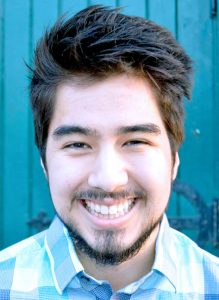 By Kenji Kuramitsu, JACL NY/SC Representative
By Kenji Kuramitsu, JACL NY/SC Representative
I recently returned from the JACL’s fall National Board meeting, held in our San Francisco office on Oct. 21. Some highlights from our time together were working through our strategic plan with Deb Ikeda and Rob Buscher, spending quality time with other young community leaders and meeting our organization’s new Masaoka and Inouye fellows.
One comment that P.C. Editorial Board chair Gil Asakawa shared stuck with me: the Pacific Citizen is in many ways this organization’s organ. That is, this forum is a living member of the wider JACL body, forming public connective tissue that helps us to actively structure our community discourse and values.
As Maya Angelou observed, the written and spoken word clings to us: “Words are things … they get on the walls. They get in your wallpaper. They get in your rugs, in your upholstery and your clothes — and finally into you.”
Words carry immense power to order and define reality. Through the enchantments of speech, we enact the powers of life and death upon one another, summoning either healing or great destruction.
The battle for words and their meanings is why we write and speak with such fervor. It’s why the JACL produced a handbook called “Power of Words,” decrying “internment” terminology and other phrasing as “euphemistic and misleading vocabulary.” In addition to “enemy nonalien” and “relocation camp,” there may be other rhetoric we should bury.
For instance, we can challenge the idea that we are an “immigrant nation.” As many indigenous and black voices have pointed out, this teaching is violent fable, based on a fundamentally unjust premise — one cannot build a multicultural democracy upon a settler colonial state founded upon genocide and enslavement.
Language allows us to properly diagnose oppression or to mask it with euphemism and gloss. Our capitol’s stunning monument to the Nikkei incarceration is officially named “Japanese American Memorial to Patriotism during WWII.” A more honest name, one critical of the state-run concentration camps, was eschewed in favor for inscribing a blood atonement politics of respectability onto our communal history.
Our language shapes our values and our public witness. One of the lessons I’ve learned during my tenure as National Youth Representative is that some of the nastiest intergenerational squabbles I’ve dealt with in the JACL have come from our lack of a shared vocabulary for social justice.
One of the ways that we can bridge this experiential gap and enrich age-diverse conversation and shared youth/elder activism is through introducing and standardizing consistent language that other activist movements have long enshrined.
For instance, empty vernacular such as “racial tension” may be more effectively remedied by terms such as “white supremacy,” a more accurate descriptor of the central organizing principle in American public life.
When we get too far ahead of our own people, it can be easy to mistake one another for the enemy. We cannot afford to leave one another behind. Participating in an intensive antiracism or social justice competency training with your local chapter board, district council or other body may be one key way of narrowing this yawning gap. Do any groups offer trainings like this in your area? Are there better ways you can think of to further decolonization and critical consciousness in your JACL community?
Your honest speech can be a tool to address the ongoing currents of violence and exclusion that pervade our society. You can start at your next chapter meeting, on social media or even by writing an article here in the P.C.
Let’s use our voices and our actions in whatever spheres of influence we have access to in order to daily denounce the snares of colonialism and capitalism.
Kenji Kuramitsu is the NY/SC Youth Representative of the JACL.



